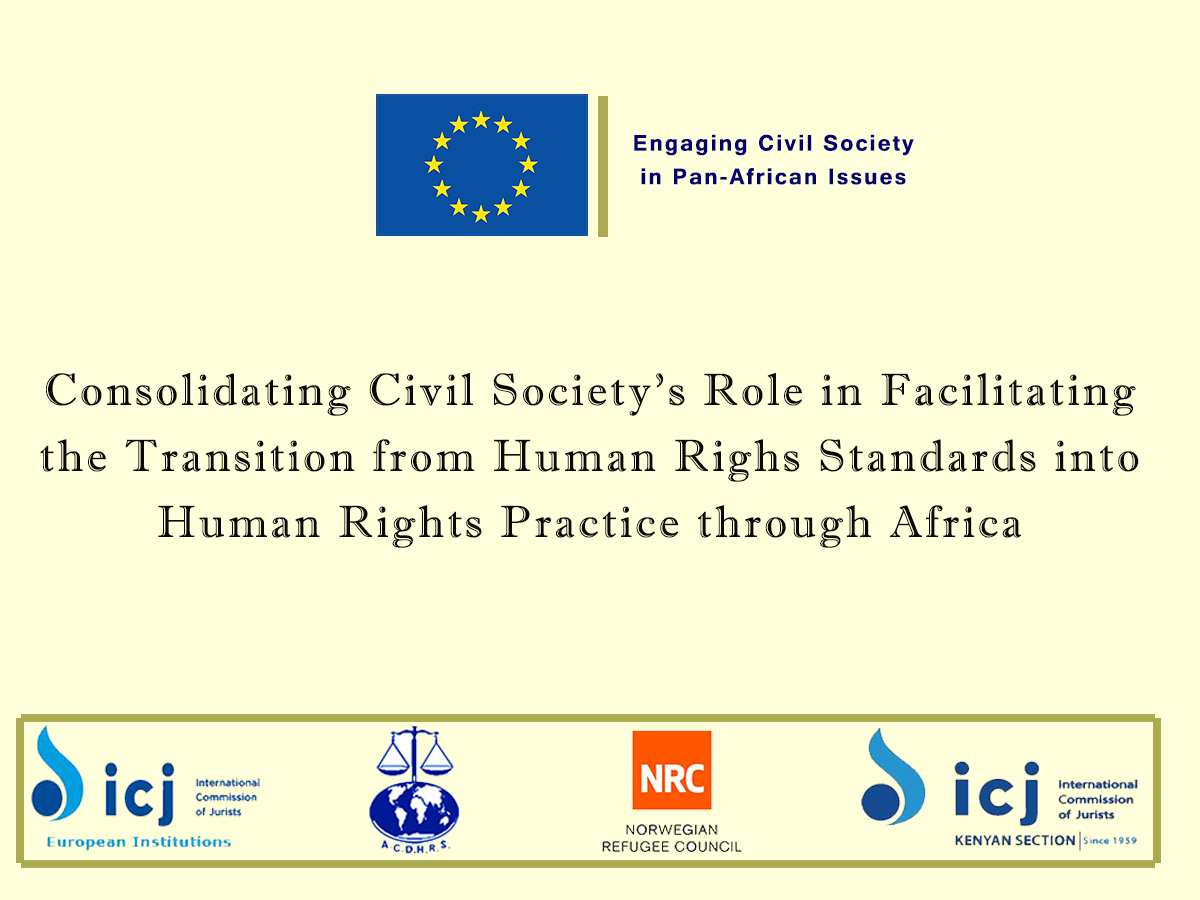Advocacy on the draft guidelines for CSO shadow/alternative reporting at the African Commission
The Meeting is an activity under the project ‘Consolidating civil society’s role in the transition from African human rights standards to practice’ funded by the European Commission and to be implemented by the International Commission for Jurists(European Institutions and Kenya branches), Norwegian Refugee Council (NRC) and the African Centre for Democracy and Human Rights Studies (ACDHRS).
The State Party reporting process is a fundamental mechanism for the monitoring of the implementation of treaties at the national levels. It provides an opportunity for the treaty body to engage with the State Party on the legislative and administrative measures that they have taken to give effect to the treaty, as well as reflect on some of the challenges to implementation. This in turn allows for critical discussion with the treaty body on how best to strengthen the state parties’ efforts to advance human rights.
The African Human Right System, State Parties to the African Charter and the Protocol to the African Charter on Human and Peoples’ Rights on the Rights of Women in Africa have an obligation to Report to the African Commission on Human and Peoples’ Rights. Article 62 of the African Charter, read with Article 26 (b) of the Maputo Protocol mandate state parties to report to the African Commission every two year, from the time of ratification of the African Charter and the Maputo Protocol. The African Commission has developed a set of guidelines to assist state to produce relevant reports to the African Commission.
An essential component of the state reporting process is Civil Society Shadow reporting of reports produced by State and in some instances civil society can produce alternative reports, where a state party has not complied with its reporting obligations resulting in civil society producing a report to highlight the human rights situation in the Country. Shadow reporting is useful in providing additional and alternative information that aids the African Commission to gain a more holistic understanding of the human rights situation of a state.
Currently there are no Civil Society guidelines on shadow reporting, and this has resulted in a lack of clear guidance on how best they can produce useful reports for the African Commission. This has resulted in continuous calls by both the civil society organisations and the African Commission for standardized shadow reports and adequate guidance on requirements and format of shadow reports.
In light of the above, The Centre for Human Rights- Pretoria University, ICJ Kenya and Equality Now held a two days consultative meeting on 4-5 September 2019 in Kigali, Rwanda with civil society organisations in the region to discuss a zero draft CSO shadow reporting guideline.
In order to build up on the draft developed in Kigali, the three partners will organise an experts’ meeting on 15-16 October 2019 in Banjul, Gambia prior to the commencement of the NGO Forum and The African Commission Session.
The draft guidelines will also form the agenda of discussion at a panel event that will be organised at the NGO forum. ICJ Kenya and its partners will also convene Commissioners and hold bi-lateral meetings with them to discuss the guidelines and get their buy in during the Commission session.
This engagement on the draft guidelines at the NGO forum and the African Commission is part of a broader project whose objectives are as follows:
i. To coordinate a process of drafting Civil Society Guidelines on Shadow Reporting;
ii. To convene technical experts both from Civil Society and the African Commission to develop the Shadow Reporting Guidelines;
iii. To advocate for the adoption of these Shadow Reporting Guidelines by the African Commission; and
iv. To popularise the reporting guidelines after their adoption by the African Commission.
DATE & VENUE: The meeting will be held in Banjul, Gambia at Senegambia Hotel on 15th and 16th October 2019.
The African Charter on Human and Peoples Rights (also known as the African Charter) establishes the African Commission on Human and Peoples’ Rights1 (The African Commission). The mandate of the Commission includes: promotion of human rights; formulation of principles and rules aimed at solving legal problems relating to human and peoples’ rights and fundamental freedoms and cooperation with other African and international institutions concerned with the promotion and protection of human rights. The Commission holds two ordinary sessions and may meet in extraordinary sessions if need arises.
The 65th ordinary session of the African Commission will be held from 21stOctober to 10th November 2019. Prior to the commencement of the Commission session, the African Centre for Human Rights and Democracy Studies will organise a forum on the participation of NGOs in the ordinary session of the Commission.
The objective of the forum is to foster collaboration among NGOs and with the African Commission for the purpose of protecting and promoting human rights.
For more information, please contact the African Centre on +220 4462338/4462340
Email: Mr John Gbenagnon (ACDHRS Communication and Information Officer) at communications@acdhrs.org
Follow us on Social Media:
Facebook:https://www.facebook.com/ACDHRS l Twitter: https://twitter.com/acdhrsorg


